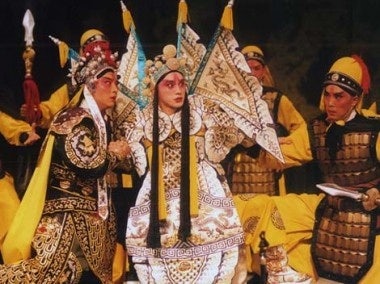Beijing Professor Launches Ambitious Translation Effort#

Is Peking Opera's muted reception abroad simply a case of being lost in translation?
In recent years, there have been attempts in China to revive traditional opera styles such as Kunqu and Nan Dan, as academics in particular have become concerned about the popularity of Hollywood, Korean pop music, and European classical music and the waning interest in national performing arts. While most of these academics have focused their efforts primarily on increasing domestic interest in Chinese performing arts, another group is taking a very different approach to keeping traditional opera alive: taking it globally. As China Daily writes today, Sun Ping, dean of the Institute of Arts at Beijing Foreign Studies University (BFSU), is convinced that Peking Opera isn't more popular internationally not because of its esoteric themes and storylines, but because its meaning gets lost in translation. Looking to remedy this, Sun is currently leading an ambitious effort to translate 100 classical Peking Opera plays into several languages.
From the article:
Based on her extensive experience of teaching at various foreign universities such as Yale, Sun said Peking Opera has what it takes to extend the global influence of Chinese culture.
"Many foreigners are fascinated by its exotic style that bears little resemblance to the art forms familiar to them in their home countries," Sun said.
Viewers can learn from these plays a great deal about Chinese traditions and core values, such as being filial to parents, loyalty, benevolence and uprightness, she said.
The endeavor is not limited to just 100 plays, and the series of translated books is expected to be acquired by libraries and become textbooks for art students in Chinese and foreign universities, Sun said.
The list of all eligible plays has been completed, and the first book, containing about 10 carefully selected masterpieces, will be published in a year's time in both English and Chinese, according to Sun. The 10 plays include Yangmen Nujiang (Women Generals of the Yang Family), Baishezhuan (Madame White Snake), Qin Xianglian and Yezhulin (Wild Boar Forest).
Considering events like the recent 11th Annual Peking Opera Festival in New York are held fairly regularly around the world, it's not surprising that Sun is confident that her project will increase interest in traditional Chinese performing arts overseas. But her methodology may see the project hit the same roadblocks that have stymied other officially sponsored "soft power" initiatives outside of China: a too-rigid focus on accentuating the Confucian, hierarchical structure of traditional opera forms in China. While Sun may think audiences, particularly in Western countries, would be thrilled to learn lessons about "being filial to parents, loyalty, benevolence and uprightness," in reality they'd likely be more interested in slightly modernized versions of Chinese classics, which accentuate the costumes and scenery while downplaying the lessons in righteousness.
As we saw from the success of Damon Albarn and Jamie Hewlett's highly stylized and thoroughly globalized 2007 stage adaptation "Monkey: Journey to the West," there's no reason Chinese opera -- adapted in a less stoic and orthodox manner -- can't appeal to international audiences.